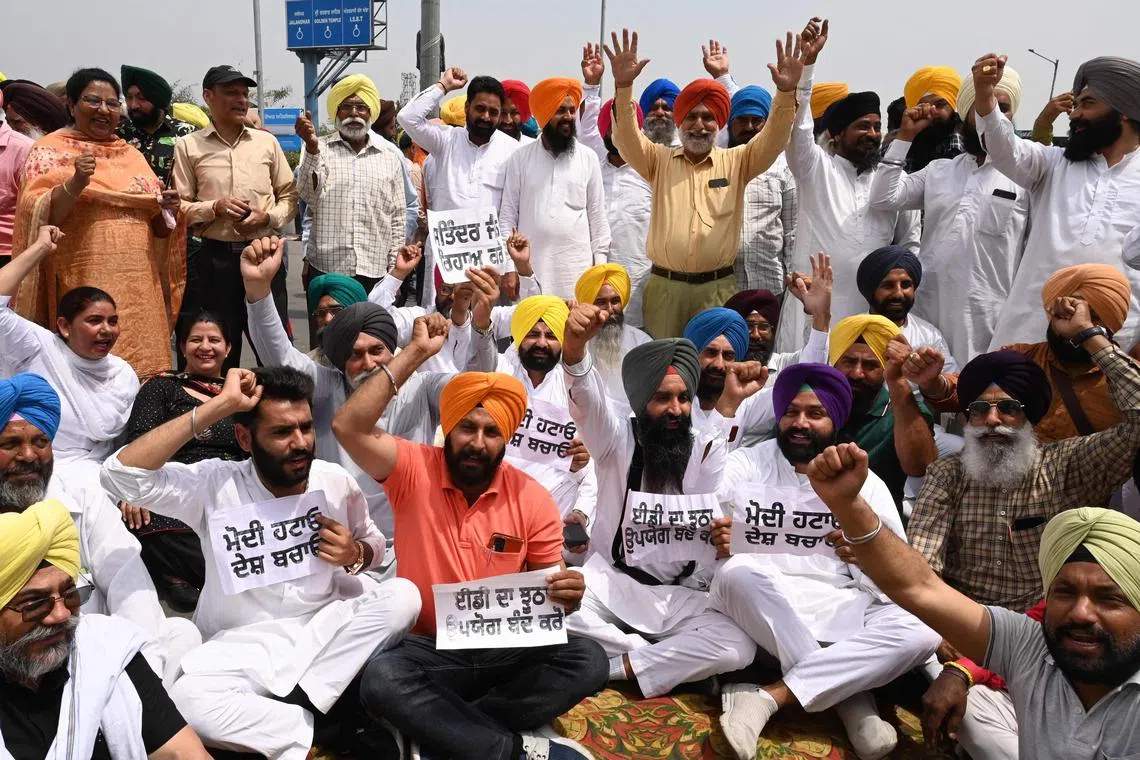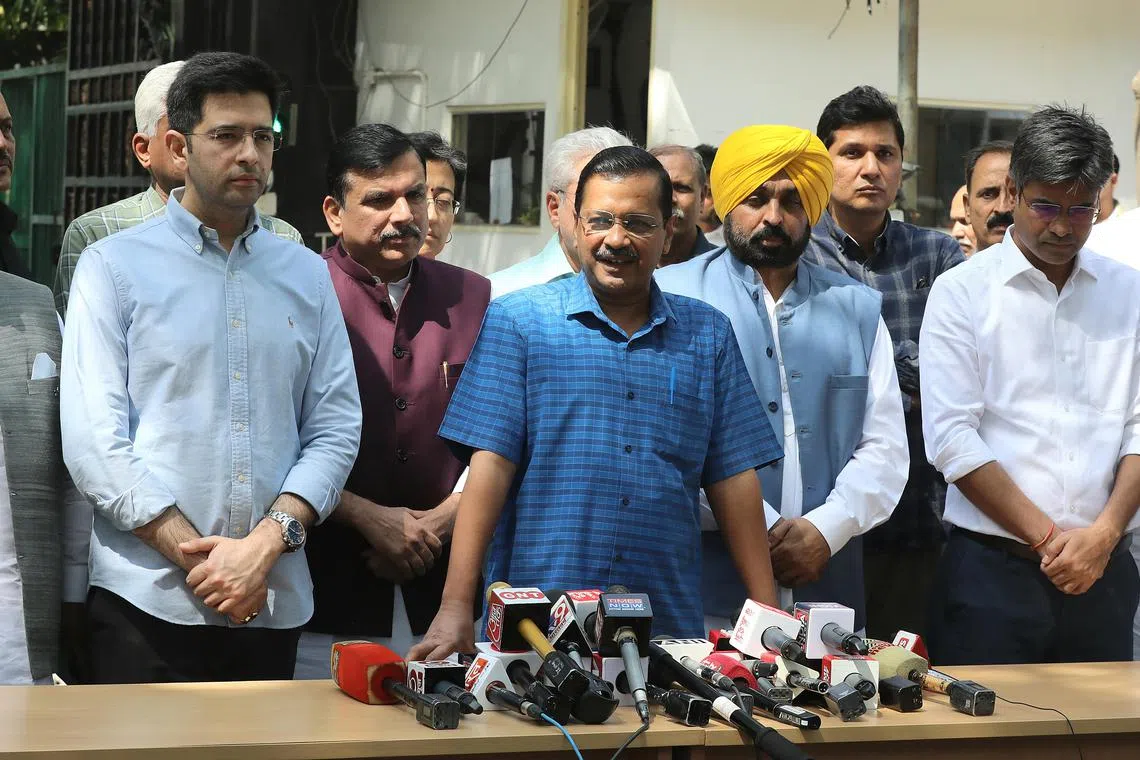India’s anti-graft Aam Aadmi Party may be laid low by corruption allegations: Analysts
Sign up now: Get insights on Asia's fast-moving developments

Activists of India's Aam Aadmi Party shout slogans during a demonstration.
PHOTO: AFP
Follow topic:
NEW DELHI – Corruption scandals may arrest the momentum of the up-and-coming Aam Aadmi Party (AAP), which on April 10 notched a major success gaining official recognition as a national party, said analysts.
Delhi Chief Minister and AAP leader Arvind Kejriwal was questioned by the Central Bureau of Investigation (CBI), a federal agency, for over nine hours on Sunday over alleged irregularities in a liquor policy
The CBI is probing allegations that the excise policy, under which the government handed over the sale of liquor to private retailers, led to undue advantages to certain private retailers and resulted in the government losing money.
The federal economic crime buster Enforcement Directorate also accused AAP of funnelling part of the kickbacks into AAP’s election campaign in Goa in 2022. Mr Kejriwal has called the charges “fiction”.
The party’s second-in-command, Manish Sisodia – Delhi’s former deputy chief minister who also headed the excise department – has been in jail since Feb 27 on charges including money laundering.
AAP has denied any wrongdoing and accused the ruling Bharatiya Janata Party (BJP), which controls the federal agencies, of targeting its leaders.
BJP, which is led by Prime Minister Narendra Modi, denied the charge and has accused AAP of corruption.
Another top AAP leader Satyendar Jain was arrested on May 30, 2022, over corruption and money laundering charges. The former Delhi health minister is accused of money laundering through shell companies and using the money to buy agricultural land in Delhi.
Having two of his closest aides in jail without bail is a blow to Mr Kejriwal’s anti-corruption stature, as was his getting summoned for interrogation, said Delhi-based columnist and political analyst Neerja Chowdhury.
“Kejriwal has tried to turn adversity into advantage. When hit with a roadblock, he has gone on the offensive with a blistering attack against the Prime Minister,” she said. Mr Kejriwal has accused Mr Modi of corruption, among other things.
“It is also an attempt to show his imprisoned colleagues he is fighting hard for them.”

Delhi Chief Minister Arvind Kejriwal (centre) was questioned for over nine hours over alleged irregularities in a liquor policy implemented by his government in 2021.
PHOTO: EPA-EFE
AAP was formed in 2012 on the back of an anti-corruption movement in Delhi in reaction to a string of corruption scandals linked to the then Congress government. Mr Kejriwal, a former bureaucrat who left his job to be a social activist, converted the movement into a political party, attracting hundreds of professionals and other first-time politicians.
Since then, the party’s growth has been swift, though bumpy.
Mr Kejriwal won the elections in 2014 in Delhi, but quit within 49 days after failing to get opposition support for an anti-corruption law. He apologised for acting hastily and resigning over the matter.
AAP under Mr Kejriwal won again in 2015 with a massive mandate, winning 67 out of 70 seats. The BJP won three seats. AAP returned to power in 2019 winning 62 seats to the BJP’s eight.
The party has won plaudits in Delhi, particularly for improving the infrastructure and quality of education in government schools.
Despite infighting, the departure of high-profile colleagues and multiple run-ins with the federal government over the past few years, Mr Kejriwal has ridden on AAP’s success in Delhi to grow the party beyond the state.
In April, the party won elections in the north-western state of Punjab, sweeping 92 of 117 seats. It also won five out of 182 seats in the western coastal state of Gujarat, Mr Modi’s childhood home town.
AAP’s presence in the two states along with Delhi and western Goa state, where it won two seats in 2020, gave it enough political presence to be recognised by the Elections Commission as a national party in April.
AAP will field candidates for 211 out of 224 seats in the May 10 elections in Karnataka, home to IT capital Bengaluru – the first time it is entering the fray in the state.
In a rally last month in Karnataka, Mr Kejriwal promised “a corruption-free government” while pledging to build good government schools and to provide quality education and free electricity.
But analysts noted that the alleged corruption cases could disrupt AAP’s traction. For one thing, Mr Kejriwal now has to focus more on governing Delhi in the absence of Sisodia, instead of campaigning in Karnataka.
AAP, which has been appealing to the Hindu right – the BJP’s core constituency – has also voiced support for Congress leader Rahul Gandhi after he was disqualified on March 24 as an MP following a two-year conviction in a defamation case.
But any move to potentially ally with the Congress party is also fraught with pitfalls, said Mr Praveen Rai, a political analyst at the Centre for the Study of Developing Societies, Delhi.
“Its strategy of aligning with opposition parties that include the grand old party will not be pragmatic, as the AAP received huge support from citizens in 2012 due to its strict stand against the corruption scandals of Congress,” said Mr Rai.
The charges included irregularities in the awarding of contracts for the 2010 Commonwealth Games, which was hosted by India.
“The alliance may or may not electorally benefit the AAP, but it certainly runs the risk of losing its hard-earned political legitimacy.”


